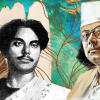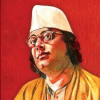Bangladesh honours Kazi Nazrul Islam's enduring legacy on 48th death anniversary

Kazi Nazrul Islam, the national poet of Bangladesh, is celebrated for his fierce spirit of rebellion and the profound depth of love and humanity in his music. Decades after his passing, Nazrul's songs and poetry continue to resonate with a timeless appeal, inspiring not just the common people but also artistes and theatre groups in Bangladesh who draw from his rich legacy to create compelling performances.
Today, August 27, marks the 48th death anniversary of Kazi Nazrul Islam, a day of reflection and tribute across the nation. Among the many commemorations, Desh Natok, a prominent theatre group, will stage two plays at the Bangladesh Mahila Samiti to honour the legendary poet.
On August 28 and 29, Desh Natok will stage the plays "Publicity" and "Ognigiri", both based on Nazrul's works, offering audiences a chance to experience his literary genius through the medium of theatre.

A tribute through theatre
The play "Publicity", adapted from Kazi Nazrul Islam's short story, has been dramatised and directed by NH Badol. The play is set to be staged at 7:30pm on August 28 at the Nilima Ibrahim Auditorium in the Bangladesh Mahila Samity. This marks the 12th production by Desh Natok, a testament to the theatre group's dedication to bringing Nazrul's stories to life on stage.
The following evening, on August 29, at the same time and venue, Desh Natok will perform "Ognigiri". Based on Nazrul's short story of the same name, this play has been adapted for the stage by Rasna Himel and directed by NH Badol. "Ognigiri" will be the 13th production by Desh Natok, further cementing the group's role in preserving and promoting the works of Kazi Nazrul Islam.
Before the performances, a discussion and cultural program titled "Bidrohi" organised by The Nazrul Centre will take place. Starting at 5pm, invited guests will delve into various aspects of Kazi Nazrul Islam's life and legacy, offering insights into the poet's enduring impact on Bangladeshi culture and beyond.

A nation remembers its rebel poet
Kazi Nazrul Islam passed away on August 29 (12 Bhadra of Bangla calendar year) in 1976, at PG Hospital, now known as Bangabandhu Sheikh Mujib Medical University Hospital, in Dhaka. He was laid to rest with full state honours beside the central mosque of Dhaka University, a fitting resting place for a man whose works have become intertwined with the nation's identity.
Nazrul's influence extends far beyond his poetry and music. Known as a poet, lyricist, musician, and philosopher, his contributions have continued to inspire generations. During the Liberation War in 1971, his songs and poems fueled the spirit of freedom and resistance, becoming anthems for those fighting for independence. Even after independence, his works have served as a source of strength in other democratic struggles.
Born on May 24, 1899, in Churulia, West Bengal, Kazi Nazrul Islam was affectionately known as "Dukhu Mia" in his early years—a name that hinted at the hardships he faced in his youth. Despite these challenges, Nazrul rose to prominence as one of the most influential figures in Bengali literature. His vast body of work includes nearly 3,000 songs, many of which he composed himself. These songs, collectively known as Nazrul Geeti or Nazrul Sangeet, continue to be cherished for their lyrical beauty and powerful messages.

After Bangladesh gained independence, the government of Bangladesh brought Nazrul and his family to Dhaka from Kolkata, where he spent the remainder of his days. Although his later years were marked by illness, his spirit remained unbroken, and his legacy has only grown stronger with time.
Through theatre, music, and cultural events, Kazi Nazrul Islam's legacy continues to thrive. His works remain a source of inspiration, not just for their artistic merit, but for the enduring messages of love, rebellion, and humanity that they carry. As Bangladesh reflects on the life and legacy of its national poet, it is clear that Nazrul's influence will continue to shape the cultural landscape for generations to come.

 For all latest news, follow The Daily Star's Google News channel.
For all latest news, follow The Daily Star's Google News channel. 









Comments